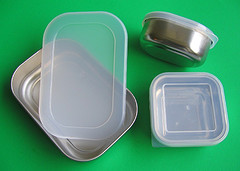
 When the microwave first came out, wasn’t it wonderful? We reveled in the ease of taking leftovers out of the fridge, tossing them in this new wonder of technology, and zap, a few minutes later, dinner! So much easier than slaving over a hot stove!
When the microwave first came out, wasn’t it wonderful? We reveled in the ease of taking leftovers out of the fridge, tossing them in this new wonder of technology, and zap, a few minutes later, dinner! So much easier than slaving over a hot stove!
Well, as you’ve probably heard, microwaving in certain plastic containers is not all that smart for our health. Since the warnings coming at us via the media and e-mail stories can get confusing, let’s narrow it down so you know exactly what to avoid to reduce your risk of cancer from this source, at least.
A lot of plastics contain what is known as bisphenol A, or BPA-a chemical used to make plastics, but that’s been suspected of being hazardous to humans for decades, and more recently, has been linked to breast cancer because of its ability to mimic female hormones, as well as to prostate cancer, because of possible gene alteration. Further, the National Institutes of Health found evidence that BPA may have adverse effects on childhood development, saying, “…there is some concern for neural and behavioral effects in fetuses, infants, and children at current human exposures.” In addition to cancer, BPA has been found in studies to be associated with heart disease and diabetes. Also used in the resin used to line food cans, BPA has been detected in the bodies of 93 percent of Americans tested by the Centers for Disease Control.
How do you avoid BPA? The Environmental Working Group (EWG) suggests limiting your exposure to foods in can or plastic containers (particularly for pregnant women and young children), and buying frozen, fresh, or glass-stored foods instead. You can also seek out manufacturers that use BPA-free containers, such as Eden Foods. If microwaving, use glass or ceramic containers, or plastics marked with a #1, 2, 4 or 5, which don’t contain BPA. Choose stainless water bottles, glass or BPA-free plastic baby bottles, and avoid canned prepared foods like pastas and soups, which according to the EWG, have higher levels of BPA than even other canned foods.
Another family of chemicals associated with cancer is the PFCs, or perfluorochemicals, which are used in carpets, clothes, furniture, non-stick cookware (like Teflon), and food packaging. These chemicals have been found in people and wildlife all around the world, and have been linked with brain and nervous-system disorders, cancer, and birth and childhood developmental effects. Studies at plants producing PFCs found that exposure was associated with a two-fold higher rate of death from prostate cancer. To limit your exposure, the EWG suggests you avoid non-stick pans (they can release toxic particles when overheated), and cut back on greasy and fast-food packages, like pizza boxes, microwave popcorn bags, and hashbrown and French-fry bags, which all contain PFCs that can break down and migrate into food. Newsweek also recommends that you avoid stain-protection treatments on furniture, shoes and clothes.
Have you changed your shopping and cooking habits to avoid these chemicals? Please share your story.
Photo courtesy Biggie via Flickr.com.

